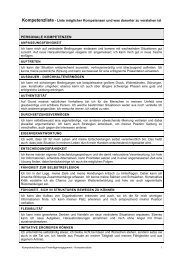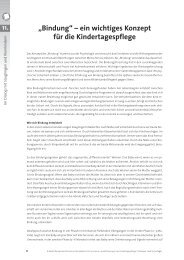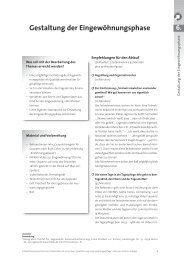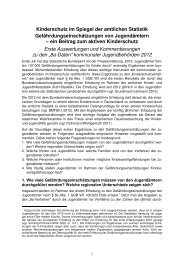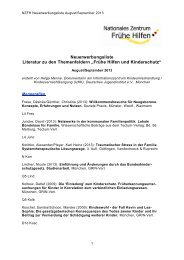download - Deutsches Jugendinstitut e.V.
download - Deutsches Jugendinstitut e.V.
download - Deutsches Jugendinstitut e.V.
Create successful ePaper yourself
Turn your PDF publications into a flip-book with our unique Google optimized e-Paper software.
the adjustment of existing processes and thereby subsequently to changes in social welfare<br />
contexts.<br />
Duration of strategy/programme implementation<br />
The implementation of programmes for improvements in the living conditions for<br />
disadvantaged children and young persons in various countries has a differing historical<br />
tradition.<br />
The first country to implement this type of programme was Ireland which initiated the<br />
programme Youthreach in 1988 to integrate young persons without school leaving<br />
qualifications into the world of employment. There are plans to continue this programme<br />
up to 2013 and it is embedded in the national strategy for the social inclusion of children.<br />
The Children’s Fund in Great Britain has existed since 2000 and will be continued in its<br />
present form up to the year 2008; thereafter it will be transformed into a Children’s Trust.<br />
Measures within the framework of the strategy Children’s Act however date back to 1989.<br />
In France, programmes targeting socially disadvantaged neighbourhoods and various<br />
problem contexts concerning children and young persons have existed since 1996. In 2003,<br />
the laws concerning the reorientation of urban politics were passed; within this framework,<br />
the National Observation Authority now collects and evaluates a variety of indicators<br />
within the areas of employment, health and education.<br />
In Germany, the first national programmes for urban planning were initiated in 1998<br />
and the programme “Development and opportunities for young people in disadvantaged<br />
neighbourhoods” was set up in 2000 and expired in 2006. Individual elements of this<br />
programme platform are however being continued; for example, the programme “Local<br />
Capital for Social Purposes” will also be supported within the framework of the next ESF<br />
support period 2007-2013. The context programme oriented to urban planning “City<br />
Districts with special Development Needs – the Socially Integrative City” will definitely<br />
continue to be funded up to 2009.<br />
Portugal began in 2001 with just a few social disadvantaged areas and subsequently built<br />
up its programme ’Escolhas’ to cover a current figure of 120 locations. The extension of<br />
this programme up to 2009 is certain.<br />
All examples display support on a long-term basis. At this point, it is not yet possible to<br />
determine on the basis of the available information which duration of programmes proves<br />
to be the most effective, but it is already clear that developments in these neighbourhoods<br />
cannot be achieved within a period of less than five years. It can certainly be confirmed<br />
that longer periods of support are necessary if sustainable effects are to be achieved and<br />
not a mere flash in the pan.<br />
Examples such as Ireland however also show that cooperation with other departments<br />
is necessary: for example, the number of early school leavers without school leaving<br />
qualifications will not decrease without a change in the Irish school system, and it is<br />
ultimately a permanent task for the state to re-integrate those who fail to achieve the school<br />
leaving certificate. A preventative approach would be more favourable which would<br />
directly target the improvement of conditions in educational establishments.<br />
113





